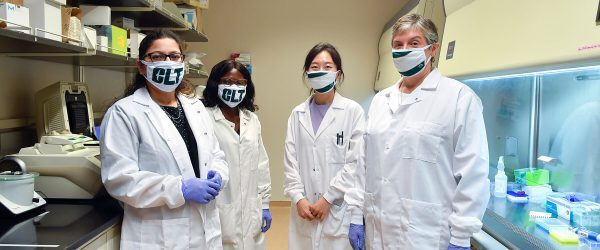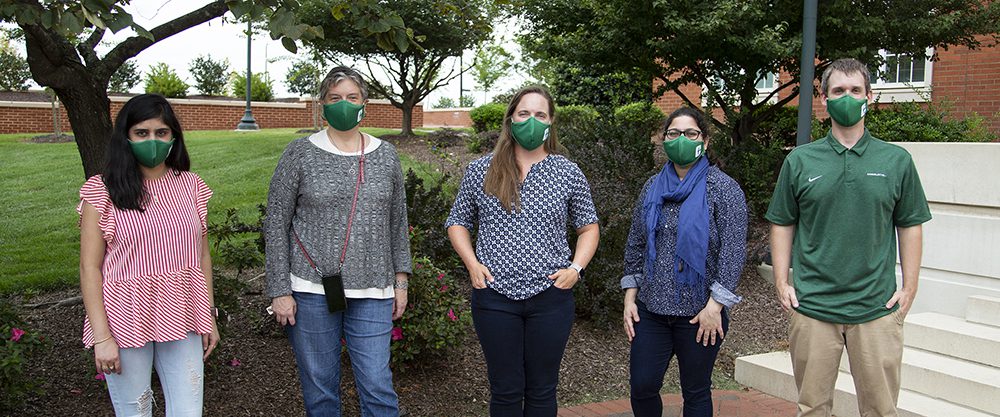UNC Charlotte’s Campus-Based Early Detection Research System Aims to Prevent COVID-19 Spread

The global pandemic caused by coronavirus, which is affecting humanity on a scale not seen in more than 100 years, is disrupting the traditional start of the academic year at colleges and universities worldwide. While the situation challenges higher education administrators on a number of fronts, researchers are able to view the crisis through a scientific lens.
“This terrible situation offers one of the most exciting opportunities for research since I’ve been a scientist,” said UNC Charlotte bioinformatics researcher Cynthia Gibas. She and a team of University researchers representing several academic disciplines, whose work was featured in the New York Times on Aug. 30, are preparing to sample and test wastewater from various campus locations as an early-warning system to locate the presence of COVID-19. Researchers in the United States and Europe have demonstrated that this type of testing can signal the emergence of potential clusters of positive coronavirus individuals several days in advance of the results of the first clinical diagnosis.
UNC Charlotte is one of several institutions nationwide to invest in campus-based wastewater testing. However, as North Carolina’s urban research university, situated in the state’s largest city, the University is uniquely positioned to draw on interdisciplinary scientific expertise to address this worldwide health crisis on campus and community levels. With plans for students to return for face-to-face instruction starting Oct. 1, UNC Charlotte leaders are focused on prevention strategies aimed at maintaining the health and safety of the University population.
Gibas and Mariya Munir, assistant professor of Civil and Environmental Engineering, with support from a number of faculty, graduate students and post-doctoral researchers are leading the wastewater sampling and testing efforts.

“Surveillance of wastewater works as an indicator because people begin shedding the virus before they are aware that they are sick,” stated Gibas. “We are planning to focus on 20 on-campus sites this semester, mostly residence halls, and then scale up to include other campus locations.”
Wastewater samples collected will be tested in specific labs within the Bioinformatics Building and EPIC (Energy Production and Infrastructure Center) that have been furnished with the equipment and technology necessary for this type of COVID-19 testing. University researchers’ efforts — from protocols to facilities — meet guidelines set by the Centers for Disease Control and Prevention’s National Wastewater Surveillance System.
Bioinformaticians from the College of Computing and Informatics‘ Department of Bioinformatics and Genomics (Gibas and Kevin Lambirth ’15 Ph.D.), have experience with the metagenomics of environmental samples, and a genomic biologist (Jessica Schlueter) will analyze variations in DNA. The Lee College of Engineering’s Munir is an environmental engineer with expertise in the quantitative detection of DNA/RNA. Wenwu Tang and Eric Delmelle from the Department of Geography and Earth Sciences in the College of Liberal Arts & Sciences are experts in geospatial data analysis. Computer scientist Srinivas Akella has expertise in optimization and robotics, and the College of Health and Human Services‘ public health scientists Shi Chen and Rajib Paul bring experience in modeling epidemics.
While wastewater-based epidemiology is not necessarily new, it is novel for the early detection of COVID-19. Its application within a college campus environment allows the University to analyze the effectiveness of this approach in a congregate living setting. Furthermore, data science applications could make possible the correlation of wastewater data with University demographics and information available from other campus-based COVID-19 mitigation efforts to produce additional and highly informative epidemic models. Findings also may be applicable to towns, cities and counties for similar investigations at neighborhood levels to foresee and abate outbreaks as well as to K-12 or similar settings.
Schlueter, an associate professor of Bioinformatics, with research expertise in molecular biology, will train students to assist with the project. She noted that the team’s COVID-19 testing may identify different viral strains on campus and link them back to the larger pandemic due to scientific advancements in DNA/RNA sequencing.
“This pandemic is a true crisis, but it is one for which we can, through our research, help our academic home, and the city and state,” said Gibas. “What we learn now will benefit us in many ways, as many predictions have us not returning to normal until 2022, and this probably will not be the last disease humanity will have to manage globally.”